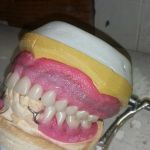
Why You Should Care for Your Teeth Even If You Don’t Have Pain
- 1. Importance of Dental Care for Healthy Teeth
- 2. Preventing Painful Problems Later
- 3. Effective Dental Care Tips for Long-Term Health
- 4. Real-Life Stories of Preventative Dental Care
- 5. Take Action for Your Teeth: How to Get Started
1. Importance of Dental Care for Healthy Teeth
It’s easy to ignore your teeth when they don’t hurt, but good dental care is essential for maintaining healthy teeth and gums over time. While many people wait until they experience toothaches or other discomforts, the truth is that preventative care can save you from major issues down the line. Regular brushing, flossing, and dental checkups are key to ensuring your teeth stay in tip-top shape, preventing potential issues like cavities, gum disease, and more.
2. Preventing Painful Problems Later
Ignoring your teeth when there’s no pain is a common mistake, but it often leads to serious problems in the future. Dental issues can develop silently without noticeable pain, such as cavities that progress without causing discomfort until they reach an advanced stage. Gum disease is another problem that can progress without pain, often leading to tooth loss or infections. Preventative care like regular check-ups helps catch these issues early, avoiding costly treatments or painful procedures down the line.
3. Effective Dental Care Tips for Long-Term Health
Here are some dental care tips to incorporate into your routine to keep your teeth healthy, even if you don’t feel any pain:
- Brush twice a day: Use fluoride toothpaste and a soft-bristled toothbrush. Brushing helps remove plaque and bacteria, keeping your teeth free from harmful buildup.
- Floss daily: Flossing removes food particles and plaque from between your teeth, areas that a toothbrush can’t reach.
- Visit your dentist regularly: Even if you don’t have pain, visiting your dentist for routine exams and cleanings can help catch potential problems early.
- Limit sugary foods and drinks: Sugar contributes to plaque buildup and can cause tooth decay. Reducing sugar intake helps prevent cavities.
4. Real-Life Stories of Preventative Dental Care
To truly understand the importance of caring for your teeth even when there's no pain, let’s take a look at a couple of real-life stories:
Case 1: Sarah was in her 30s and had never had any issues with her teeth. She rarely experienced pain and only visited the dentist when necessary. However, during one of her regular check-ups, her dentist discovered early signs of gum disease. Because of the preventative care, Sarah was able to address the issue before it became painful or led to tooth loss.
Case 2: John, on the other hand, avoided dental checkups because he never had any tooth pain. Over the years, he developed cavities that he didn’t notice until they became severe. By the time he saw a dentist, he needed multiple fillings and a root canal to fix the damage.
5. Take Action for Your Teeth: How to Get Started
It’s never too late to start caring for your teeth. By implementing the tips mentioned earlier and scheduling regular dental visits, you can keep your smile healthy for years to come. Don’t wait for pain to remind you that your teeth need attention—take action now to prevent future discomfort and costly treatments. If you’re looking for a dentist or need oral care products to help with your dental routine, explore trusted options to take care of your teeth before problems arise.







 Wilshire Periodontics & Dental5.0 (2 review)
Wilshire Periodontics & Dental5.0 (2 review) Classic Dental Laboratory0.0 (0 review)
Classic Dental Laboratory0.0 (0 review) Lakeview Dental PC4.0 (29 review)
Lakeview Dental PC4.0 (29 review) Grafton Dental Care4.0 (152 review)
Grafton Dental Care4.0 (152 review) Dental Health Associates - Sun Prairie Clinic4.0 (622 review)
Dental Health Associates - Sun Prairie Clinic4.0 (622 review) Honey Creek Dental4.0 (58 review)
Honey Creek Dental4.0 (58 review) The Importance of Oral Health Education During Pregnancy for a Healthy Pregnancy
The Importance of Oral Health Education During Pregnancy for a Healthy Pregnancy Best Tips for Brushing Your Teeth Properly for Healthy Gums: Essential Techniques for Oral Health
Best Tips for Brushing Your Teeth Properly for Healthy Gums: Essential Techniques for Oral Health Why Skipping Dental Checkups Can Lead to Bigger Oral Health Problems
Why Skipping Dental Checkups Can Lead to Bigger Oral Health Problems Advantages of Porcelain Dental Restorations
Advantages of Porcelain Dental Restorations How Can Diabetes Cause Tooth and Gum Problems? Preventing and Managing Oral Health Issues
How Can Diabetes Cause Tooth and Gum Problems? Preventing and Managing Oral Health Issues Healthy Habits for Promoting Good Oral Health and Hygiene: Tips for a Healthy Smile
Healthy Habits for Promoting Good Oral Health and Hygiene: Tips for a Healthy Smile